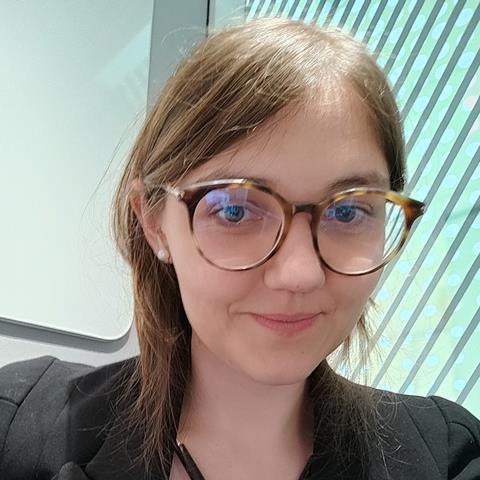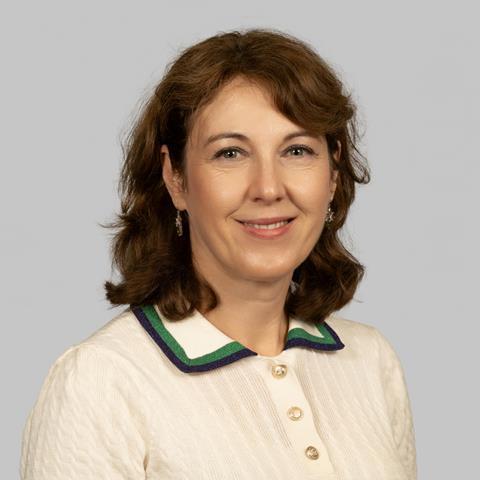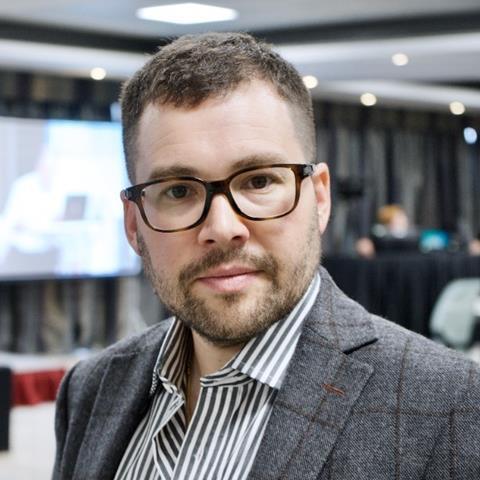The chemists who have achieved professional success by following up their PhDs with an MBA

‘I’m a free electron,’ is how Valerie Cladera describes herself. With a colourful career in strategic consulting, she credits both her PhD and MBA for attaining her dream job.
During the second year of her PhD in photochemistry at Sorbonne University, France, she realised she didn’t want to spend her career in research and development. ‘I am passionate about many things, and I wanted to be close to business and understand the business world,’ she explains. Alongside her PhD she was able to attend training on business-related skills, and after hearing about the MBA programme at ESCP Business School, she instantly knew that this was the field she wanted to go into.
An MBA – master of business administration – is the world’s most popular graduate management degree. It provides a holistic overview of business, cutting across marketing, finance and accounting, and also helps develop soft skills and leadership skills, boosting career and salary prospects. The most recent type of MBA programme – the Stem designated MBA – has spread across the US and includes more quantitative coursework and data science, along with a greater focus on artificial intelligence.
Cladera started her MBA before finishing her PhD. ‘For me, accounting was new, finance was new, management was also new, and I learned a lot.’ Her MBA was split between Paris and Berlin. When she moved to Berlin she became more involved in the entrepreneurial school, where she picked up new skills in coaching and consultancy. While networking during the course, she met a lot of people from her future workplace – the enterprise software company SAP, and she was offered a role there as a value advisor.
Going the distance
‘Science and engineering schools don’t really provide the fundamentals of how businesses work to the extent that they should,’ says Maziar Shakerzadeh. He’s currently completing an MBA from the University of Warwick, UK, by distance learning while working full time at a textile company in Australia. ‘I think if someone has a technical background, some understanding of business could be a very critical asset for any company.’
Shakerzadeh’s career has spanned many fields, from his PhD in materials science at the Nanyang Technological University in Singapore to roles in data storage, defence research and automotive product development. Through this journey, he realised that there was a disconnect between technical expertise and business knowledge and skills.
It is not easy. But it is doable
His drive to start an MBA came from wanting to move to consultancy. But the breadth of the course is leading him to consider other options. ‘It gives me a full picture of how businesses work,’ he says. ‘You get to the fundamentals of everything and then you can choose one or two [topics] to specialise in.’ He is now more open to the idea of staying in industry: ‘There are other things I can do in industry like manage operations and sustainability.’
Balancing work and study is challenging but he is getting used to it. ‘It is not easy. But it is doable. It’s possible and it’s once in a lifetime. An investment in all senses.’
John Byrne, an educational coach and MBA expert, agrees about the value an MBA provides. ‘You’re much more likely to get promoted into general management positions with an MBA than you would with a narrow science degree.’
But that comes at a price. In many cases, an MBA is one of the most expensive postgraduate degrees on offer – according to a study by the Education Data Initiative, the average total cost is about £43,000. Scholarships are available based on academic merit and financial need, and some companies may help fund an employee’s studies on condition that they remain in employment for a certain number of years afterwards. MBAs can also boost earning potential, with reports claiming that average starting salaries for MBA graduates are more than double the average cost of the course.
Nevertheless, certain organisations hold MBAs in higher esteem than others. ‘I would recommend people try networking and mentoring before they do the MBA – it might open doors to an employer who will value them without an MBA […] or one who will pay for their MBA,’ advises Joe Renny, an MBA graduate who is now head of corporate development at CatSci, a scientifically-led innovation partner for medicines development. ‘It’s not a panacea and can cause financial and personal stress.’
Work experience
The ideal combination, according to Byrne, is to have a Stem background, and after years of working in your field, complete an MBA to get general management education. ‘That opens up a lot more opportunities for you while you still have your depth in a field of science,’ he explains.

Marilena Radoiu is an example of this winning combination, who got the idea to pursue her MBA after several years of work experience. After a first postdoc using microwave techniques in Prague in the Czech Republic, her second postdoc at Queen’s University in Canada introduced her to industrial companies, where she ‘got really interested in doing industrial projects and not just research for research’s sake and publishing papers’.
She started working in the UK at BOC Edwards in gas abatement – breaking down exhaust gases from the semiconductor industry using plasma technology. During her first eight years of working, she was exposed to technical marketing, pursuing market expansion opportunities. But she missed hands-on chemistry, so she joined a small company in France that wanted her to help them develop microwave-assisted chemistry. ‘I went from a very big company to a very small company and when you work for a small company you have to wear many hats,’ she explains. As a result, she became involved with international business development, reorganising the company and working in general management and human resources – in addition to the R&D work she was doing. In 2009, during the financial crisis and with many companies going bankrupt Radoiu had to make quick, strategic decisions based on her experience rather than any professional training.
Radoiu started an executive MBA in 2016, which she completed in nine months. An executive MBA is an advanced business degree programme specifically designed for professionals who are over 10 years into their careers, and allows them to continue their full time work as classes are typically conducted on evenings and weekends. ‘It wasn’t an easy nine months – no personal life – but this was a personal project for me,’ says Radoiu. She has no regrets.
‘The MBA validated that the decisions I made [in my previous roles] were correct and it has helped me quite a lot in the last seven years,’ she says. While she originally planned to return to the company she was working for, during her MBA she became interested in running her own company after learning about entrepreneurship, being your own boss and employing people.
Radoiu now runs her own consulting company, Microwave Technologies Consulting, that bridges the gap between basic microwave research and what the industry needs. She works with startups around the world, looking at how they can obtain patents, build a lab and employ their first employee. She plans to keep on building on her business: ‘In the next five years I want to be more involved in knowledge transfer and training in the industry.’
Navigating a course

Renny’s career journey has not been linear but more of a ‘squiggly kind of path … build your yellow brick road one brick at a time’. During a postdoc at Cornell University, US, researching fluorinated aryllithiums, ‘one of my friends planted the seed. Why don’t you go and do an MBA? Because you’re interested in the application of science.’ But Renny didn’t act on that advice until eight years later.
In the meantime, he went on to work for Dow Chemicals, where he was directly involved in projects that solved fundamental problems and introduced him to the commercial aspect of business. This inspired him to go down the route of being a scientist directly involved in commercial decision making. He then took a few detours working for corporate research and development and even as a political organiser, but they all had one thing in common – ‘I was good at solving problems in different contexts.’
Eventually he started working with friends who had started their own company. ‘That’s a very entrepreneurial environment and the science that we were doing was very client-focused and very application-focused,’ Renny says. It was here he realised he needed to develop commercial and business oriented skills that he hadn’t been exposed to in the past.
The skillset gained through an MBA is significantly different to that from a PhD. ‘[The MBA] was a very good crash course of developing knowledge in some different areas and interacting with different groups of people,’ says Renny. He found that the focus was on communicating value and meaning immediately with a top-down thinking approach, whereas a scientist can be very focused on a technical outcome. Since his MBA he has been able to work on strategies to improve CatSci’s position in the current market. ‘I’m very focused on what’s going on from a macro point of view and how that might influence any changes,’ he explains. His day to day is varied and he likes the challenges that come with growing a biotech business.
The skills I learned during my MBA are useful for me every day
There are some transferrable skills from a PhD that are useful when studying an MBA, such as project management and problem solving. A PhD in a scientific discipline complements the added skills learned during an MBA programme. ‘You’re not bringing the same type of expertise when you come with a PhD. It’s a big experience,’ says Cladera, adding that a PhD in chemistry is valuable even if you’re doing strategic consulting – you are managing three years of one project end to end. Byrne agrees: ‘If you come into a business programme with a Stem background, I don’t think that anything in an MBA programme is going to be challenging to you,’ he says.
Cladera’s career options widened considerably after completing her MBA. After working in strategic analysis in procurement solutions, she’s now a value advisor in charge of the French speaking area of Switzerland for SAP, overseeing several accounts, assessing businesses and their futures and helping them transform objectives into outcomes. ‘The value advisory is a role I didn’t know of before,’ she says. ’It’s very different to what I was thinking and all the skills I learned during my MBA are useful for me every day.’ But her work is not completely separate from her scientific background: ‘Of course, my heart is close to chemistry, and I am having a lot of chemical customers.’
‘I say in life you’re presented with a series of opportunities, and you take them, and you learn from those experiences,’ says Renny, who is applying his MBA skillset in his current role, looking at cost of capital, inflation and the financial risks in developing new medicines. ‘I want to continue to be at the interface of science and corporate and business development.’

















No comments yet